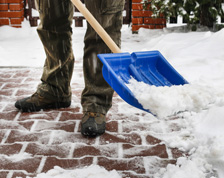Prepare for winter with a business disaster recovery plan
Posted in Business

Winter weather is unpredictable, and you can’t always prepare for winter storms on short notice. However, your business could weather the storm with the correct systems in place. From creating a proper plan for winter storms to designing a business disaster recovery plan, you could help lessen the effects of inclement weather and get your company back to productivity.
Business disaster recovery plans may look different across events, but customer, client, vendor and employee safety are the top priority. Disaster recovery plans fall under the umbrella of business continuity. The difference is business continuity focuses on staying operational during a disaster and disaster recovery plans are for after the disaster.
Grange Insurance's Risk Control Services are a great resource to help you create a business disaster recovery plan. A few things they may advise you to add in your plan include:
- Winter storm prep
- A communication plan
- A data recovery plan
- A supply checklist in case your employees are stranded onsite
You may need to provide support and safety procedures for off-site and on-site employees, or your brick-and-mortar shop needs special attention before a blizzard. Grange Insurance has the tools you need to prepare for winter with a business disaster recovery plan.
Prepare for winter storms in the short-term and long-term
An effective business disaster recovery plan is important. Understanding how to prepare your business for winter storms is a good business practice as well. A business prepared for the effects of a winter storm may recover faster than the competition.
Preparing your business for winter in the short-term and the long-term are equally important. It’s better to plan in the long-term and have those preparations already in place when a disaster, like a blizzard or ice storm, strikes. For example, you should winterize your business to keep your facility, and everyone inside, safe from the harshness of winter.
Sometimes, winter storms can happen fast and without much time to prepare. Fortunately, last-minute preparations are easier to implement within a few weeks, days or hours of a winter storm.
Here’s a checklist to use to prepare your business for winter storms:
Short-Term Winter Storm Preparation
- Review your winter storm plan in your business continuity plan
- Set expectations with employees and keep them informed before, during and after the storm
- Follow weather updates
- Add ice melt to sidewalks
- Add non-slip mats and fans for water removal by building entrances
Long-Term Winter Storm Preparation
- Hire a snow and ice removal service
- Inspect building insulation
- Add new tires to your business fleet
- Stay up-to-date on vehicle maintenance
- Maintain the roof on your building

Business Insurance
Create and execute your communication plan
Good communication is an essential business practice not only for employee retention, but also for keeping your customers and team safe. Businesses can work on a long-term communication plan anytime of the year, but an emergency communication plan should go into effect immediately.
Involve your employees as much as possible when developing this process. Find out if they prefer an email, a text, a phone call, a PC alert, an intercom announcement, or other forms of communication. In addition, routinely asking your team to confirm or update their contact information makes the flow of emergency communication more effective.
There are several factors for businesses to consider when executing your winter emergency communication plan. Templated messages based on these considerations are the best way to ensure timely and effective communication.
Timing
Winter storms can be unpredictable. A storm could happen overnight without any warning. Timing can inform the best way to communicate with your employees about an upcoming storm and what the recovery may look like.
For example, if a severe winter storm is predicted to arrive in one week, a mass email to your employees informing them about your work from home policy should suffice. Is there a winter storm coming tomorrow? Consider using a mass text message platform to notify employees on whether your business is open the next day or not. If there’s a bad winter storm happening while everyone’s already at work, an urgent safety protocol announcement pushed to all PCs, cell phones, emails and PA systems within your company are good avenues.
Severity
Some winter storms are stronger than others. A light snow during the workday warrants a message telling employees to lift their windshield wipers up to avoid them freezing to their car. However, a major blizzard heading to the area justifies an emergency message informing everyone of the best course of action. You can center your messages around the National Weather Service’s definitions of winter storm severity to keep language consistent.
Accessibility
Not all employees work at a desk with access to email or phones. If you have warehouse employees, an intercom announcement is the best option regardless of the timing or severity. The same can be said for delivery drivers who are best reached by a phone call.
How quickly a message is received by your team goes along with how quickly you can ensure their safety.
Create a data recovery plan
Most businesses handle some sort of valuable or sensitive data. You may be aware of the threat of cyberattacks, but events completely outside of human control — winter storms — are just as dangerous. Your business might be vulnerable to losing data if your network is compromised due to a power outage from a blizzard. Creating a data recovery plan to recover this data is critical to your overall business continuity plan.
The best way to prevent losing the data for good is performing frequent backups and storing your data off-site. This way, there’s another location where your data exists and can be restored from after disaster strikes.
Fortunately, Grange Insurance offers cloud computing service interruption coverage and service interruption coverage including data restoration within their equipment breakdown coverage. Talk to your independent Grange agent about this additional insurance coverage that could help mitigate disaster in the event of a power outage.
Stock up on supplies
In addition to having an emergency recovery plan for winter in place, you should also have supplies on hand to last at least 72 hours. Winter storms can last for days and affect your property’s power, pipes, roadways and more. Keep a fully-stocked emergency kit with these items to prepare for the unexpected:
- Food and water
- Flashlights
- Extra blankets
- First aid kit
- Shovels, scrapers and deicer
- Two-way radio
- Fully powered portable chargers
- Generator (follow OSHA’s portable generator safety standards)
Review your insurance coverage
Your local, Grange independent agent is happy to go over your current business insurance and explore additional business coverage options. Our experts want to ensure you’re covered just in time for winter and prepared for everything that comes with it. Be sure to ask about our Risk Control Services. Our risk management consultants will help you identify risks and provide solutions to mitigate those risks with a business continuity plan.
Coverages described herein may not be available in all states. Please contact one of our local independent agents for complete details on coverages and discounts. If the policy coverage descriptions herein conflict with the language in the policy, the language in the policy applies. The material provided above is for informational, educational and/or suggestion purposes only, and does not imply coverage. WE RESERVE THE RIGHT TO REFUSE TO QUOTE ANY INDIVIDUAL PREMIUM RATE FOR THE INSURANCE HEREIN ADVERTISED. Applicable policies may be underwritten by Grange Insurance Company, Trustgard Insurance Company, Grange Indemnity Insurance Company, Grange Insurance Company of Michigan* and Grange Property & Casualty Insurance Company*, Integrity Insurance Company*, Integrity Property & Casualty Insurance Company*, Integrity Select Insurance Company*. *Not licensed in Pennsylvania
References
The National Weather Service
Red Cross
OSHA
Share via:
Facebook
Twitter
LinkedIn
Related resources


